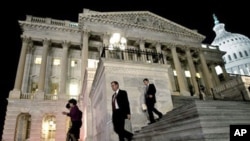Efforts to cut the U.S. federal budget to counter a rising deficit projected at $1.6 trillion this year are now moving to the Democratic Party dominated Senate.
The Republican controlled House of Representatives passed a bill early Saturday with about $60 billion in spending cuts.
During Saturday’s early morning debate House Speaker John Boehner said the next few months will be the most important Washington has seen in decades.
In a vote which ended at four in the morning, lawmakers voted almost entirely along party lines. Most Republicans were in favor of the bill to cut current spending by about 14 percent, while Democrats were in opposition.
The bill is a stop-gap measure known as a continuing resolution. It establishes spending levels for the rest of the fiscal year ending in September.
But Democratic lawmakers in the Senate have promised to remove many of the bill’s cuts.
These include eliminating spending to carry out President Barack Obama’s health care reform law. The cuts also target federal funding for family planning, the government’s ability to enforce environmental regulations, education programs, subsidies for the poor and foreign aid.
The bill does include increases, such as a nearly two percent rise for defense spending, despite some internal Republican opposition.
During the House debate, California Republican John Campbell was one of those urging deeper defense cuts. "There are many weapons systems funded in the Defense Department which the Defense Department does not want. They are there because of influential members of Congress who have put them in. Defense has always been the most earmarked section of the entire budget," he said.
Democratic lawmakers, such as Georgia’s Sanford Bishop, warned against cuts that would affect war veterans. “If this bill is signed into law it will hurt our economic recovery which in turn will affect our veterans. According to the Bureau of Labor Statistics, more than 15 percent of Iraq and Afghanistan war veterans are unemployed, far higher than the national jobless rate. If we follow through with some of these disastrous cuts we will see that rate go higher," he said.
The Senate is expected to spend the next few weeks debating and writing its own version of a government funding bill. Senate Democrats say they also want to begin shrinking the deficit, but not the way House Republicans voted for.
If no compromise is found by March 4, when current funding expires, a U.S. government shutdown becomes a possibility, unless all parties, including Democratic President Obama, can agree on a short-term spending bill.




